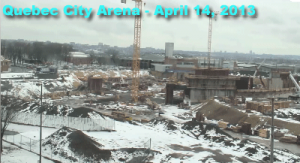The market’s stinging rebuke of the NHL’s early-stage expansion process was surprising, to say the least.
No Seattle. No Hamilton. No Portland. No second Toronto franchise. Of the whopping 16 groups invited to the party, only two decided to put on their dancing shoes and send in applications: Las Vegas and Quebec City. Not coincidentally, both of those cities have reasons to secure a franchise that transcend the $500 million expansion fee.
The NHL issues a thinly veiled response to the lack of applications
The NHL’s reaction to the lack of applications was terse:
Our purpose, in initiating the expansion process in the manner we did, was not only to explore the possibility of admitting new members to the NHL but also, at the outset, to set realistic guideposts to distinguish between bona fide expressions of interest (i.e., those which have at least substantial ownership capabilities and an arena or the realistic possibility of an arena) from those indications of potential interest which were, at best, merely hopes or aspirations. Apparently, only Mr. Foley and Quebecor have the confidence in their ability to secure an arena and suitable ownership capability to move forward with this process. (NHL.com)
Some have suggested the NHL’s short (even more so than originally announced) deadline didn’t allow enough time for many groups to get their acts together. Others believe hazy arena situations were the primary culprit. For most, both likely played roles, although the vast majority of would-be applicants have been working on their respective projects for many months, if not years. None of the serious candidates were at square one when the NHL opened the door for applications.
In the end, the receipt of just two applications from interested parties demonstrates inherent flaws in the system. The NHL has, to this point, doubled-down on its word, insisting that there will be no adjustments to the process.
The league’s stubbornness is a mistake. Sticking to arbitrary dates and figures that are not conducive to success — despite the NHL’s insistence to the contrary — is a PR distraction at best and a long-term problem at worst. Encouraging more applications would equate to a greater number of choices, which in turn would help set the NHL’s trajectory over the coming months and years.
It shouldn’t be all about process. It should be about getting it right.
Can the application process be fixed? Yes, as long as the NHL is willing to walk back on a few self-avowed sticking points and doesn’t allow intransigence to stand in the way. With that said, the following are three things the NHL should consider in order to invigorate its flagging expansion efforts.
Move back the date
Two expansion applications for (likely) two slots opening up for the 2017-18 season pretty much ties the league’s hands.
Adding both Las Vegas and Quebec City won’t solve the league’s imbalance problem, unless it chooses to shove Detroit or Columbus back to the West. The vetting process becomes perfunctory, unless the NHL decides to go with neither (imagine the outcry) or one. If it goes with just one, there’s an uneven number of teams, creating further imbalance as well as scheduling difficulties.
Las Vegas and Quebec City may end up making perfect sense. However, to ensure that the best cities are selected, there should be more from which to choose. Additional time would give groups on the the fence the ability to get their acts together.
Bend, don’t break
The NHL isn’t a government. It’s an organization in which individual members compete with one another within an eclectic array of regions, cultures, values and economic circumstances. It doesn’t have to place process over progress.
Some cities (Las Vegas, Quebec City, Portland, Houston) have their arena situations resolved. Others (Seattle, arguably Hamilton, Toronto) do not. The city governments for each vary with respect to their willingness to pony up resources or in utilizing political muscle toward bringing the NHL to town. In part due to shifting variables, some groups weren’t willing to take a shot.
Straitjacketing applicants at this early stage probably cost expansion applications. Encouraging demand — whether lowering the bar for application, reducing the application fee, waiving the non-refundable $2 million, flexibility on temporary arenas, or something else altogether — should be the primary goal.
Lower the franchise fee
The elephant in the room is the NHL’s stated $500 million expansion fee.

According to this Forbes report, the average NHL franchise was worth $490 million at the end of 2014. That’s very close to the expansion fee set by the league earlier this year.
However, the value of an established franchise should be greater than what amounts to a start-up business that lacks marquee players, proven market acceptance and fan loyalty. Ownership groups are being asked to pay the midpoint of NHL franchise values while attempting to make it all pencil out in combination with an arena that could run another $500 million. For the vast majority of potential ownership groups, that just wasn’t happening.
Lower the expansion fee to $400 million. There are fifteen franchises worth that amount or less per the Forbes list, illustrating that it is not an unreasonable figure. In lieu of investors betting on snagging a troubled, relocating franchise over the next few years, give them a reason to think twice about expansion.
Las Vegas and Quebec City would celebrate a reduction in the fee, reaping the benefits along with everyone else. Spread over 30 teams, the reduction wouldn’t make or break the finances of any current ownership group. And although it would require “adjustments” to previously stated missives, the league could spin it as being flexible, responsive to the marketplace and magnanimous, all at the same time.
Thoughts? Should the league consider adjustments in order to prompt more expansion applications? Leave your thoughts below, or send to @McLaughlinWalt.